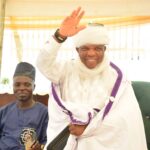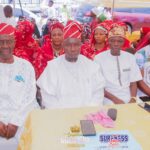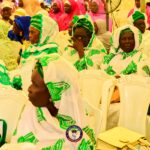In the vibrant cultural calendar of Yoruba land, few festivals shine as brightly as Ojude Oba. While the Ijebu Ode edition may be more widely known, the Ojude Oba of Iperu Remo stands out as a deeply meaningful celebration, rich in tradition, color, and community spirit. Held annually, usually two to three days after Eid-el-Kabir (Ileya), this festival is a time when the sons and daughters of Iperu return home to pay homage to their royal father — the Alaperu of Iperu.
A Festival Rooted in Loyalty and Culture
“Ojude Oba” literally means “the king’s forecourt” in Yoruba, and true to its name, the celebration revolves around the palace of the Alaperu. It is a cultural tribute paid by the various regberegbe (age-grade groups), families, and individuals who gather to express their allegiance, gratitude, and well-wishes to the monarch.
But Ojude Oba is more than just a royal visit. It is a melting pot of Iperu’s cultural richness — a place where history, fashion, music, and unity converge.
The Role of the Alaperu of Iperu
The Alaperu, as the traditional ruler of the town, plays a central role in the festivities. The event begins with special Islamic prayers (for Muslim indigenes), followed by Christian and traditional blessings. The Alaperu then sits in royal majesty at the palace forecourt, receiving greetings and tributes from all quarters.
Over the years, the throne has served not only as a symbol of authority but also of unity, peace, and cultural preservation. The Ojude Oba festival reinforces this by bringing all indigenes — regardless of religion, political affiliation, or class — under one umbrella.
Age-Grades (Regberegbe): The Heartbeat of the Festival
One of the most captivating aspects of Ojude Oba Iperu is the regberegbe parade. Each age-grade group appears in uniform attire (aso ebi), displaying elegance, discipline, and community pride. With drummers, dancers, and praise singers in tow, they march to the palace in style, often engaging in friendly competition over who brings the most flair.
These age-groups are not just cultural dancers — they are agents of development. They organize town projects, provide support during emergencies, and keep the spirit of unity alive in Iperu.
Horse Riding and Cultural Displays
Another thrilling part of the celebration is the horse riding tradition. Members of noble families, often descendants of warriors or prominent chiefs, mount beautifully adorned horses and perform traditional gallops in honor of the king. This echoes the historical bravery of Iperu warriors and symbolizes strength, loyalty, and honor.
Traditional drumming, Yoruba chants, colorful fanfares, and even modern music also blend into the festivities, giving it a timeless feel that appeals to both the old and young.
Ojude Oba and the Diaspora
For many Iperu indigenes living outside the town — whether in Lagos, Abuja, London, or the U.S. — Ojude Oba is a homecoming. It’s a time to reconnect with one’s roots, check on family, give back to the community, and celebrate the Iperu identity. Many even form WhatsApp groups or fundraising platforms just to prepare their regberegbe participation ahead of time.
The economic impact is also significant: local tailors, caterers, photographers, and artisans benefit greatly from the preparations and celebrations.
Preserving Culture in a Modern World
Ojude Oba Iperu serves as a powerful reminder that modernization doesn’t mean abandoning tradition. In fact, it shows that with the right platform, culture can thrive and even adapt in the digital age. The festival is often streamed online, with hashtags and live updates, allowing Iperu sons and daughters around the world to participate virtually.







